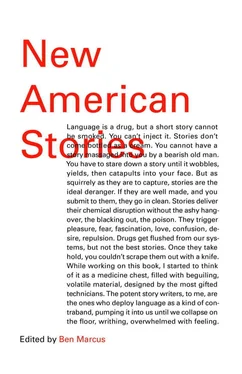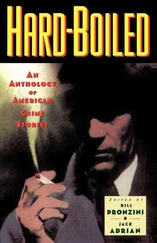— Love, said the Judge quietly, he stopped the other yesterday. Hasn’t it been enough?
Carr could not hear her reply, but the Judge spoke again, and then she spoke. She spoke on and on, her voice rising. The Judge turned back then, and his face was grieving.
— Take one, he said. Take a gun. Let’s be done with it.
Carr took the pistol closest to him. It felt strange in his hands, smooth and heavy.
The Judge took the other revolver and went out onto the track. Carr followed.
The lines were still there where they had been drawn. A sickness was in Carr’s belly. He felt himself thin and weak. He was walking and he was not. He felt that he was watching himself walk to where he would begin.
The Judge was where he would be. Carr heard the Judge’s wife call out the signal.
Then they were walking toward each other. Carr held the pistol out in front of him. He pointed it like a stick and pulled at it with his fingers. He pulled with all his fingers and it went off. It went off again. The Judge was still there. They were at the lines. The Judge fired. He fired again. Carr felt his chest was hurting. He felt his legs hurt. He was firing, and the air was very clear. There was a hole in his chest. He could see it there. When had it happened? This was another thing that could not be fixed. Panic and his face white, and he was on the ground with his hands.
He could not see the Judge. He could not see the Judge’s wife. The cinders of the track were in his hair. He could feel the track beneath him, and stretching out in every direction above there was a depth to the clouds that seemed very far and good. But then he saw that it was shallow. He felt very much that the sky was shallow, not a trick but something worse, absent all human ambitions. He thought that there were clouds and then clouds behind clouds, and then just air. Where is there that’s far enough?
Then shapes took their places. Men were looking down at him. The Judge, the doctor. There was blood on the Judge’s coat. The doctor was saying something. He was moving his hands in a gesture. What did it mean? Carr felt if only he knew what the gesture meant, then there would have been something, some one thing to salvage from all of this. But the figures had become very small. One couldn’t see them at all, no matter how hard one looked.
SOME OTHER, BETTER OTTO by Deborah Eisenberg
“I don’t know why I committed us to any of those things,” Otto said. “I’d much prefer to be working or reading, and you’ll want all the time you can get this week to practice.”
“It’s fine with me,” William said. “I always like to see Sharon. And we’ll survive the evening with your—”
Otto winced.
“Well, we will,” William said. “And don’t you want to see Naomi and Margaret and the baby as soon as they get back?”
“Everyone always says, ‘Don’t you want to see the baby, don’t you want to see the baby,’ but if I did want to see a fat, bald, confused person, obviously I’d have only to look in the mirror.”
“I was reading a remarkable article in the paper this morning about holiday depression,” William said. “Should I clip it for you? The statistics were amazing.”
“The statistics cannot have been amazing, the article cannot have been remarkable, and I am not ‘depressed.’ I just happen to be bored sick by these inane — Waving our little antennae, joining our little paws in indication of — Oh, what is the point? Why did I agree to any of this?”
“Well,” William said. “I mean, this is what we do.”
—
Hmm. Well, true. And the further truth was, Otto saw, that he himself wanted, in some way, to see Sharon; he himself wanted, in some way, to see Naomi and Margaret and the baby as soon as possible. And it was even he himself who had agreed to join his family for Thanksgiving. It would be straining some concept — possibly the concept of “wanted,” possibly the concept of “self”—to say that he himself had wanted to join them, and yet there clearly must have been an implicit alternative to joining them that was even less desirable, or he would not, after all, have agreed to it.
It had taken him — how long? — years and years to establish a viable, if not pristine, degree of estrangement from his family. Which was no doubt why, he once explained to William, he had tended, over the decades, to be so irascible and easily exhausted. The sustained effort, the subliminal concentration that was required to detach the stubborn prehensile hold was enough to wear a person right out and keep him from ever getting down to anything of real substance.
Weddings had lapsed entirely, birthdays were a phone call at the most, and at Christmas, Otto and William sent lavish gifts of out-of-season fruits, in the wake of which would arrive recriminatory little thank-you notes. From mid-December to mid-January they would absent themselves, not merely from the perilous vicinity of Otto’s family, but from the entire country, to frolic in blue water under sunny skies.
When his mother died, Otto experienced an exhilarating melancholy; most of the painful encounters and obligations would now be a thing of the past. Life, with its humorous theatricality, had bestowed and revoked with one gesture, and there he abruptly was, in the position he felt he’d been born for: he was alone in the world.
Or alone in the world, anyway, with William. Marching ahead of his sisters and brother — Corinne, Martin, and Sharon — Otto was in the front ranks now, death’s cannon fodder and so on; he had become old overnight, and free.
Old and free! Old and free…
Still, he made himself available to provide legal advice or to arrange a summer internship for some child or nephew. He saw Sharon from time to time. From time to time there were calls: “Of course you’re too busy, but…” “Of course you’re not interested, but…” was how they began. This was the one thing Corinne and her husband and Martin and whichever wife were always all in accord about — that Otto seemed to feel he was too good for the rest of them, despite the obvious indications to the contrary.
Who was too good for whom? It often came down to a show of force. When Corinne had called a week or so earlier about Thanksgiving, Otto, addled by alarm, said, “We’re having people ourselves, I’m afraid.”
Corinne’s silence was like a mirror, flashing his tiny, harmless lie back to him in huge magnification, all covered with sticky hairs and microbes.
“Well, I’ll see what I can do,” he said.
“Please try,” Corinne said. The phrase had the unassailable authority of a road sign appearing suddenly around the bend: FALLING ROCK. “Otto, the children are growing up.”
“Children! What children? Your children grew up years ago, Corinne. Your children are old now, like us.”
“I meant, of course, Martin’s. The new ones. Martin and Laurie’s. And there’s Portia.”
Portia? Oh, yes. The little girl. The sole, thank heavens, issue of Martin’s marriage to that crazy Viola.
“I’ll see what I can do,” Otto said again, this time less cravenly. It was Corinne’s own fault. A person of finer sensibilities would have written a note, or used e-mail — or would face-savingly have left a message at his office, giving him time to prepare some well-crafted deterrent rather than whatever makeshift explosive he would obviously be forced to lob back at her under direct attack.
“Wesley and I are having it in the city this year,” Corinne was saying. “No need to come all the way out to the nasty country. A few hours and it will all be over with. Seriously, Otto, you’re an integral element. We’re keeping it simple this year.”
“ ‘This year’? Corinne, there have been no other years. You do not observe Thanksgiving.”
Читать дальше










![Женя Джентбаев - neo futura [stories]](/books/692472/zhenya-dzhentbaev-neo-futura-stories-thumb.webp)

